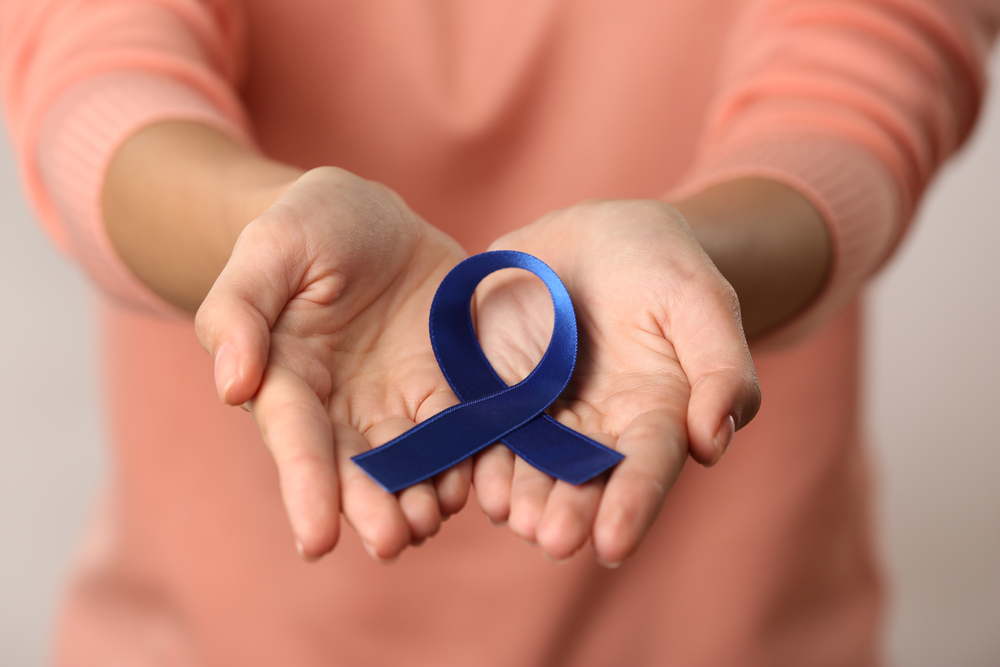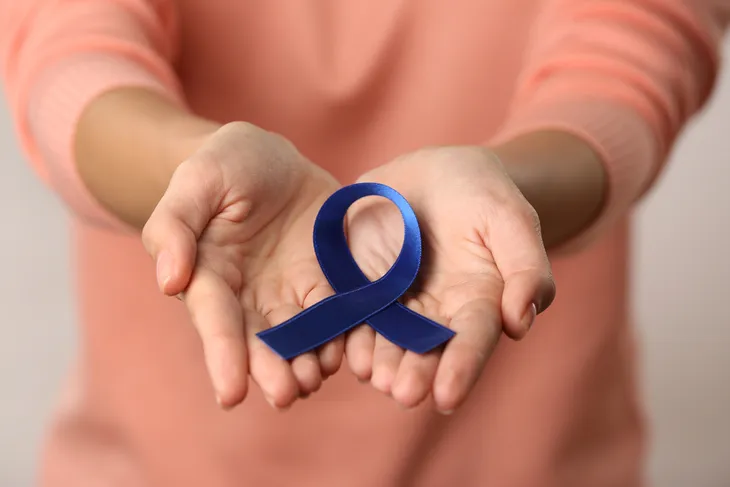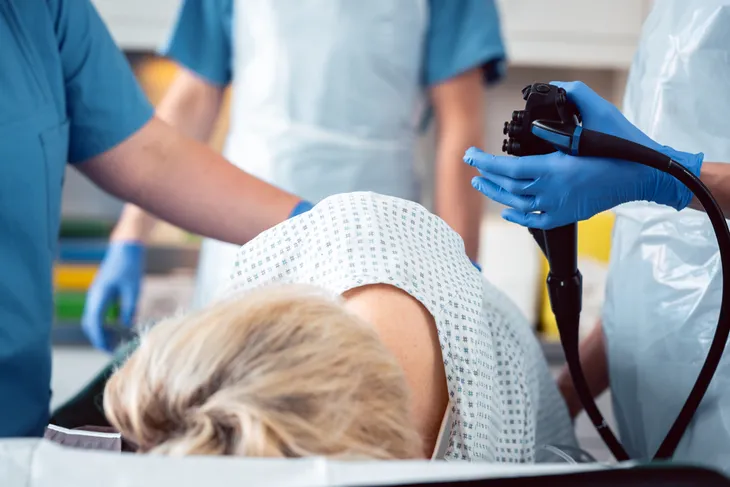- Bowel cancer is a common type of cancer that begins in the colon or rectum.
- It’s one of the most fatal types of cancer, but nearly 70-percent of fatalities could be prevented with proper screening.
- Getting a colonoscopy every 10-years starting at age 45 can help detect colorectal polyps and cancer early.
- Early diagnosis can be life-saving, so it helps to recognize the symptoms and understand the risk factors.
Bowel cancer, also called colorectal cancer, is a type of cancer that begins in the colon or rectum. It’s an incredibly common type of cancer. In fact, 1 in 20 people will be diagnosed with bowel cancer in their lifetime, according to Fight Colorectal Cancer (Fight CRC).
Additionally, Everyday Health says it’s the second-leading cause of cancer fatality behind lung cancer. One reason for the high fatality rate is that bowel cancer can be hard to detect in the early stages. That’s why it’s important to know the symptoms, causes, and risk factors.
What Is Bowel Cancer?
Bowel cancer is a general term for cancer in the large intestine. It may be called colon cancer or rectal cancer, depending on where it begins. “Colorectal cancer occurs when the cells that line the colon or the rectum become abnormal and grow out of control,” according to the Cleveland Clinic.
The National Cancer Institute (NCI) estimates that there will be 151,030 new cases of bowel cancer in 2022. Additionally, the source estimates 52,580 bowel cancer fatalities in 2022. Fortunately, Fight CRC says bowel cancer is preventable and treatable.
Early Symptoms of Bowel Cancer
Some people don’t experience symptoms in the early stages of bowel cancer. However, there are some common signs and symptoms. According to Healthline, early symptoms include:
- Blood in the stool
- Abdominal pain
- Excessive gas
- Constipation
- Diarrhea
The National Health Service (NHS) says over 90-percent of people with bowel cancer have a combination of those symptoms. Of course, less serious conditions can also cause these symptoms. But persistently experiencing them can be an indicator of bowel cancer.
Late-Stage Symptoms of Bowel Cancer
Generally, symptoms are more noticeable in late-stage bowel cancer. According to Healthline, late-stage symptoms include:
- Excessive fatigue
- Vomiting
- Feeling like your bowels won’t empty
- Unexplained weight loss
- Continuation of early-stage symptoms
If bowel cancer spreads, then there are additional symptoms to keep in mind. For example, the source says those can include jaundice, swollen hands or feet, chronic headaches, blurry vision, and breathing difficulties. Bowel cancer affects everyone differently, so this isn’t a comprehensive list of symptoms.
When to See a Doctor
Early diagnosis can be life-saving, so it’s important to take the symptoms of bowel cancer seriously. As previously mentioned, the early symptoms of bowel cancer can be caused by less serious conditions. For instance, constipation is a symptom of many things that aren’t life-threatening.
However, you should take note if you experience any of the signs and symptoms of bowel cancer. If symptoms last longer than a week, then Healthline recommends seeing a doctor. The doctor can then assess your symptoms and determine if bowel cancer screening is necessary.
Causes of Bowel Cancer
While researchers aren’t certain what causes bowel cancer, in many cases, the Mayo Clinic says it generally begins when the DNA of healthy cells changes. “When a cell’s DNA is damaged and becomes cancerous,” the source says, “cells continue to divide — even when new cells aren’t needed.”
Over time, the source explains, those cells accumulate and form a tumor. Even though experts don’t fully understand what causes bowel cancer, several risk factors can increase your chances of developing colon cancer or rectal cancer.
Risk Factors You Can’t Control
Some factors that increase the risk of developing bowel cancer can’t be changed. For instance, you can’t control your age, race, genetics, or family medical history. While these risk factors are unavoidable, it can help to be aware of them:
- Age: “About 90% of colorectal cancer cases occur in people 50 and older,” according to Verywell Health.
- Race: The Mayo Clinic says African Americans are more likely to develop bowel cancer than other races.
- Genetics: Everyday Health says an inherited gene mutation called Lynch syndrome increases the risk.
- Family history: A family history of colorectal cancer or polyps increases the risk, according to the Centers for Disease Control and Prevention (CDC).
Risk Factors You Can Change
On the other hand, some bowel cancer risk factors can be changed. According to Everyday Health, modifiable risk factors include:
- Excess weight around the midsection
- Smoking
- Heavy alcohol use
- Eating red meat and processed meat
- A sedentary lifestyle
So, staying active and eating healthy can make a difference. For instance, those who eat processed meat frequently may want to cut back. That’s because the World Health Organization (WHO) classifies processed meat as “carcinogenic to humans.” And if you need another reason to quit smoking, then add bowel cancer to the list.
Lynch Syndrome
As previously mentioned, having Lynch syndrome increases the risk of bowel cancer. According to Everyday Health, someone with Lynch syndrome has an up to 80-percent lifetime risk of developing the disease. They also have an increased risk of other cancers, including uterine and ovarian cancer.
Unfortunately, many people who have Lynch Syndrome don’t know they do. According to Fight CRC, “an estimated 95% of Lynch syndrome cases are undiagnosed.” The source says insurance often covers genetic testing if someone in the family has been diagnosed with Lynch syndrome.
Although it’s worth keeping in mind that “most colorectal cancer is not caused by inherited mutations,” according to the CDC. As a matter of fact, Fight CRC says only up to 5-percent of bowel cancer cases are due to Lynch syndrome.
Diagnosing Bowel Cancer
If your doctor thinks you could have bowel cancer, then they may recommend a colonoscopy. It’s a common procedure that can spot colorectal polyps and cancer. According to the Mayo Clinic, a doctor uses a long, flexible tube with a camera attached to view the colon and rectum during a colonoscopy.
Other tests and procedures include blood tests, fecal tests, or a sigmoidoscopy. According to Healthline, blood tests can help rule out other conditions, while fecal tests can detect blood in your stool. And a sigmoidoscopy is a less invasive alternative to a colonoscopy that allows the doctor to examine part of the colon.
Stages of Bowel Cancer
Each stage of cancer represents how far the disease has spread. Doctors need to know the stage because it can help them design the right treatment plan. Here’s how the Cleveland Clinic defines the stages of bowel cancer:
- Stage 0: The disease is only present in the lining of the colon or rectum
- Stage 1: It penetrates the lining but doesn’t spread beyond the intestine’s muscular layer
- Stage 2: The cancer moves beyond the muscular layer but hasn’t reached the lymph nodes
- Stage 3: An advanced stage of cancer where the disease has spread to the lymph nodes
- Stage 4: The disease has spread to distant organs, which can include the lungs or ovaries
According to Everyday Health, the 5-year survival rate is about 90-percent if the cancer’s found before it spreads beyond the colon or rectum. Unfortunately, the source says only about one-third of cases are diagnosed that early.
Bowel Cancer Treatment Options
Your doctor will recommend treatment based on the stage of your cancer. According to Everyday Health, common treatment options include surgery, chemotherapy, and radiation therapy. If you have early-stage cancer, then the source says the doctor may be able to remove it during a colonoscopy.
But if the cancer is more advanced, then the Mayo Clinic says you may need more invasive surgery to remove part of the colon. Everyday Health says both chemotherapy and radiation therapy can help destroy cancer cells and shrink tumors. Depending on the situation, your doctor may recommend a combination of treatments.
Bowel Cancer Prevention
The CDC estimates that 68-percent of bowel cancer fatalities could be prevented if everyone got screened as recommended. However, Fight CRC says 1 in 3 adults aren’t up to date with colorectal cancer screenings. The American Cancer Society (ACS) recommends starting regular screenings at age 45. Those with an increased risk may need to start earlier.
If there isn’t anything concerning, then you should plan to get screened with another colonoscopy in 10-years. Additionally, lifestyle adjustments can help prevent the disease. For one thing, a bowel cancer diet rich in fiber and antioxidants can help. Cutting back on processed meat, red meat, and alcohol can also make a difference. And anyone who smokes should talk to their doctor about strategies to quit.















